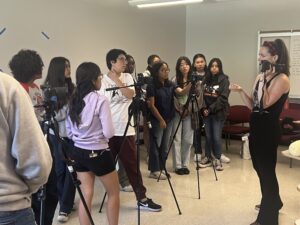“These are not only stories about food, but about migration, separation, and deep pain and loss. This is a chance to conserve some of their cultures, despite the separation caused by migration and legal status.” – Sarah Portnoy PhD, Professor at USC
Supported by a Humanities for All Project grant, “Voces de las Abuelas: Mexican and Mexican American Women’s Oral History Project” conducted in collaboration with LA Plaza de Artes y Cultura, amplifies the voices of indigenous, Mexican, and Mexican American abuelitas (grandmothers) who have cooked, preserved, and passed on Mexican and Mexican American cuisine. Through a documentary film, audio stories that can be accessed with QR codes; photographs; kitchen artifacts; and family recipes, this exhibit at LA Plaza Cocina in Los Angeles, reveals each abuela’s relationship to Mexican cuisine, their birthplaces in Mexico, and the city of Los Angeles. To learn more about the creation of “Voces de las Abuelas,” we spoke with the project director, Sarah Portney, a USC Professor and the author of Food, Health, and Culture in Latino Los Angeles.
Can you tell us a little about yourself and what inspired you to undertake this project?
I am a professor in the Department of Latin American and Iberian Cultures at USC, where I have been since 2007. I received a PhD in Romance Languages and Literature at UC Berkeley in 2005, with an emphasis in folklore. From 2001-2002, I did extensive dissertation fieldwork in Mexico, Cuba, and Spain, collecting romances and corridos about women protagonists. Romances are ballads passed down through oral tradition dating back to the 15th century.
Food is another lens to learn about culture and traditions, one I have been using to teach and research for over a decade now. I have been teaching students to do food ethnography projects–interviews with a community member in Spanish–about their food culture and how migration and assimilation affected it–for a long time. So, the questions were already in my head. I just needed the project for them. The opening of LA Cocina at LA Plaza created the opportunity.
How did you go about making connections with the abuelitas – the women who are at the heart of the project?

I asked a lot of people if they knew a grandmother with a rich culinary history. I knew 3 of them already. Merced and I have worked together on street vendor legalization issues for many years. Ana Guzman works for Feast For All, a South L.A. non-profit that works on health and wellness in the community. Consuelo Perez is the mother of my children’s second-grade teacher and is well known in Santa Monica USD for her tamales.
I found other abuelas through word of mouth. I was looking for women from different states of Mexico and various indigenous groups. The oldest abuela, Rachel Aguilar, is the grandmother of my colleague from USC Annenberg, Amara.
You are a humanities professor and instructor at a major university. How does doing a public-facing project of this sort fit in with your academic work?
I had a sabbatical this past semester, which allowed me the time to do the filming. This past spring, I taught three classes while finishing work on the documentary and the exhibition. It was quite challenging to manage, but the USC Annenberg class provided a lot of multimedia material for the exhibit. I would not have known how to create audio and video stories with our footage from filming without the support of the students and my USC Annenberg colleague, Amara Aguilar.
What difference has the project made for the people involved and the broader community?
It has provided a great sense of pride in their cuisine and traditions. This pride is shared by the broader community and the children and grandchildren of each woman involved. We all witnessed this pride the night of the event as each abuela took photos in front of her picture with her family.
What has been most surprising/gratifying/rewarding for you as you’ve done this work?
The most rewarding part for me is being able to share stories that are not typically placed on the walls of museums. When one of the abuelas shared something very personal, meaningful, and –at times–heartbreaking, I felt very grateful that she trusted me enough to share her story. These are not only stories about food but about migration, separation, and deep pain and loss. This is a chance to conserve some of their cultures, despite the separation caused by migration and legal status.
Click here to view a virtual tour of the Abuelita’s Kitchen: Mexican Food Stories exhibit, and learn more about Sarah’s projects here.






